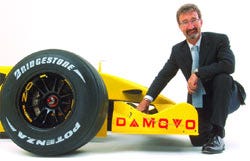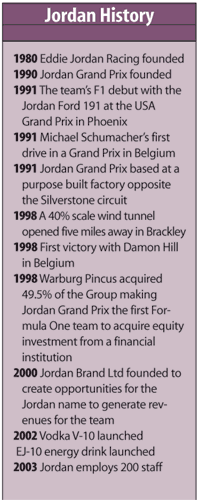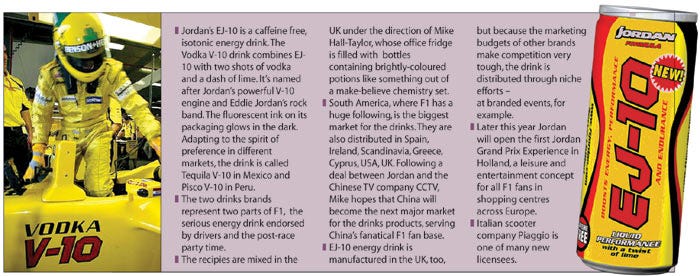Eddie Jordan
]> Jordan Brand Limited was set up in 2000 to develop ways of generating revenue for the Jordan racing team. Jordan's brand extension programme has already spa
April 6, 2018

]>


Jordan Brand Limited was set up in 2000 to develop ways of generating revenue for the Jordan racing team. Jordan's brand extension programme has already spawned two successful drinks brands. Last year it committed to expand its licensed product range beyond the trackside and into the high street by appointing a licensing agent.
At Jordan's HQ opposite the Silverstone circuit, in between races at Imola and Barcelona, we talked to Eddie Jordan about his vision for bringing the Jordan brand to life and fired questions about licensing to Mike Hall-Taylor, head of Jordan Brand Limited. Not surprisingly for a company known for its defiant independence it has an unusual and ambitious approach to licensing and brand extension.
Imagine this: your brand extension becomes so valuable as a stand-alone consumer product that, as a realisable asset, it has potential to bring more value to your company than any other income stream. Jordan thinks this might one day be the case. Consumer products could become a way of creating large cash injections for the team to supplement the ever more elusive sponsorship income.
Driving for more than 90 minutes at 200 miles per hour just one inch off the ground produces a very particular set of brand values. They are defined by terms like glamour, glitz, danger and speed. Surprisingly these values have never really been exploited before and are the hooks on which the Jordan brand extension depends. More specifically, Jordan's own brand values are about being maverick, the underdog, accessibility, youth and colour. As far as new products are concerned, these are the values Jordan can bring to the party. They differ considerably from other F1 brands, most of which are controlled by corporations with big budgets and err on the serious nature of the sport. Ferrari or BMW, for example, would be very unlikely to launch an international vodka drink as Jordan has.
Ever since he launched the Jordan team into the world of F1 Eddie has wondered how the Jordan values could be applied to other areas. Its engineers, for example, are working to build faster, lighter, smarter, safer machines. If this expertise could be harnessed and mixed with the fabled Jordan spirit then the result could be very exciting.
Eighteen months into Jordan Grand Prix Limited, the company began to ask itself what the Jordan brand stood for, on and off the track. What did fans really like about Jordan and what made Jordan different from other F1 teams? Eddie says: 'Almost without knowing it we had created a unique lifestyle brand with the potential to shake things up in new produce categories. To me this means letting more people enjoy the spirit we have already brought to Formula 1.' 

It's what marketing people call a brand extension programme.
Mike, how do you define the Jordan brand?
Jordan is a sports brand with attitude. It's not in the luxury category, rather it's the peoples' team and takes the spirit of F1 to them. Our aim is to deliver quality products to the mass market.
How important is the dominant yellow colour?
The bright colour helped position the company and is still dominant. In 1996 when Benson & Hedges first got involved the car was gold. But that didn't come across very well on television. It turned beige for the next season before finally becoming the distinctive rich yellow colour. We also added an angry snake on the nose, which caused quite a stir at the time.
We work with much smaller budgets than other teams, so we have to find ways of being highly distinctive at lower cost. Even if you aren't winning you have to raise your profile and be seen in order to attract sponsors and find licensees.
Why was Jordan Brand Limited created?
To borrow the values of Jordan Grand Prix to produce revenue that can be ploughed back into the team to supplement our two other income streams - sponsorship and TV.

Explain the licensing strategy?
We have two concurrent strategies. Firstly, the licensing programme (run by agents CPLG) generates income. Secondly, the brand development strategy requires investment and is managed differently. One feeds the other.
Prior to the appointment of CPLG we had an ad-hoc approach to licensing and about 17 licensees. In an ideal world every licensed product would have a Wow factor, utilising our technology, for example. Realistically you weigh that against licensees that can sell volumes of product and generate income.'
Your first brand extension was a drink - not a usual start. How did this come about?
A branded drink came out very strongly from focus groups as something we should do, so we did it. And now distribution is rooted we can add to the products available. First we created EJ-10 energy drink and then the market demanded the extension to the Vodka V-10 drink. We're looking at more drinks extensions, perhaps slammers and beers, as well as things like energy gum.
What impact does brand extension revenue have?
2003 drinks revenue is forecast to create £750,000 of profit for Jordan Grand Prix and the market is by no means mature. But what's more important is we are building a business with value.

Does £750,000 make a difference, given the huge finance needed for an F1 season?
In 2003 the team will spend £50m and 75% of that income comes from sponsorship. Consumer products income could realistically be as much TV revenues. More importantly, in the long term, consumer products can create value.
For example, if an fmcg product can realistically achieve a £15m profit, the value of that business is a multiple of that figure. Theoretically Jordan Brand Limited could be valued at twice the value of Jordan Grand Prix Ltd.
So you think of the brand extensions as assets that could one day be sold?
In the future, the consumer products businesses could be assets that are very valuable. So yes, there might be a time when it's appropriate to realise those assets for sums that would compete with sponsorship and TV revenues.
I see other brand extension businesses such as apparel developing a momentum of their own and representing tangible value for the group.
Do you think it's an unusual strategy for a brand?
To me it's very simple: if we stick with standard licensing deals, we're limited to what's in the box. If we push the boundaries there is huge potential to create value. So we do both.
Eddie, why have you always felt Jordan branded products would work?
I'm 100% devoted to motor racing. That's our core business. But it always felt the Jordan lifestyle was about combining the technological and human sides of what we do, and that was an opportunity. I'm heavily into music so it followed that the Jordan team had a younger, more vibrant image that could be marketed as a brand. In these difficult times it's helping us attract sponsors and making money for us. It's had a really positive effect already.
How do you sum up the Jordan lifestyle?
As a brand we have a slightly irreverent attitude, we're slightly the underdog taking on the big players. We have to take care with that because it can wear thin. We aren't the most prolific winners but our focus is on winning. People ask me if winning will alter our brand values. Some people think if we win we'll lose a certain ethos. I disagree. Winning is important for your fans, too.
Why do you think other companies are interested in the brand?
On top of the brand values we have a valuable platform we can offer partners. If I put V-10 on the car it's seen by hundreds of thousands of people. Especially in some countries this is very powerful. It is also very easy for licensees and distributors to experience the brand and to get behind it.
Do you crave success on the high street as much as you do on the track?
In the UK there are so many brands to compete with and we can't do the same big spend, so we go about things differently.
Is it important to you to see your brand distributed in different retail outlets?
Does it make me feel good? I suppose so. But I think we'll always try to link with other brands and it has to work with the motor racing experience. Which is why the drinks idea was fun. We called it after my rock band. It couldn't be U2 so we named it V-10! Now it's taken on a life of its own because people can really see the synergy between the drink and the sport.

What's the definition of the good Craic?
It's about being with friends you really like, a carefree time, preferably with music and a drink. It's about laughter and fun.
Mike, what makes you so confident you can create stand-alone products that will exist on the high street?
I believe the Jordan brand can appeal beyond the F1 fan base and our drinks are the first example of this. If you take Jordan out of South America, the vodka drink brand will still exist. The test would be to drop the Jordan name from the bottle and see if it works. I believe it would -- a sure sign we've created a stand-alone drinks brand. I think it can happen with toys, bikes, equipment and clothing, too.
How much retail interest is there so far in licensed products?
For maximum revenue we know the high street is where the brand has to be. At the moment F1 isn't well-represented on the high street so there is a huge opportunity.
Other F1 teams have dabbled in this area -- most notably Williams F1 deal with UK retailers Halfords and Marks & Spencer. I think we have a stronger proposition because Jordan can offer something which doesn't have to be so serious. We are in discussions at the moment with a UK retail chain.
How important is trackside distribution?
Trackside sales are important but quite distinct from branded products on the high street. The consumer that will buy a t-shirt at the race and wear it all weekend probably won't wear it later on. I'd like to see the two channels co-existing but distinct.
At one end of the scale there are loyal customers that want to purchase everything available and feel part of the team. At the other there are teenagers in a bar in Equador drinking V10 because they think F1 is hip. All these people are buying into the Jordan brand.
How does performance on the track influence the success of products?
A win produces belief. So it really helps. It's less important for the drinks products but very important for trackside and website traffic. And it helps get the big deals in.
However, as long as there's a Jordan Grand Prix team and there's Eddie Jordan then we have hooks to build the brand on.
How would you like to see the Jordan brand in five years' time?
I hope that we'll have more branded product on the high street in categories like toys and apparel and I see a more structured approach to licensing, leading to the creation of more fmcg products. We want Jordan to be prominent as the sports brand with attitude.
What do you think are the main issues facing brands like Jordan wanting to extend?
Some brands have done a really good job. JCB and Caterpillar translate onto the high street. But they are few and far between. I think sports brands are generally under-developed and F1 has a way to go. I hope our approach will push the boundaries.
What are your and Eddie's dream licensed products?
I'd like to see skiwear, radical sports equipment and the sorts of products where technology, particularly carbon fibre, could really add. The one factor no licensees have really exploited yet is the fundamental importance of safety within F1. There are huge opportunities for safety equipment. And there is more to shoes and driving than meets the eye. But my real ideal would be a Jordan licensed roller coaster ride. Eddie's well known for his love of spectacles, so I think his ideal product would be specs.
You May Also Like






